Tag Archives: smart phone
October 2023 Br J Cardiol 2023;30:151 doi:10.5837/bjc.2023.031
A survey of digital access, digital confidence and rehabilitation delivery preferences of patients referred for CR
Helen Alexander, Andrew D’Silva, Christopher Tack, Aynsley Cowie
| Full text
October 2017 Br J Cardiol 2017;24:137–41 doi:10.5837/bjc.2017.025 Online First
Heart rate monitors and fitness trackers: friend or foe?
Edward Doris, Iain Matthews, Honey Thomas
| Full text

